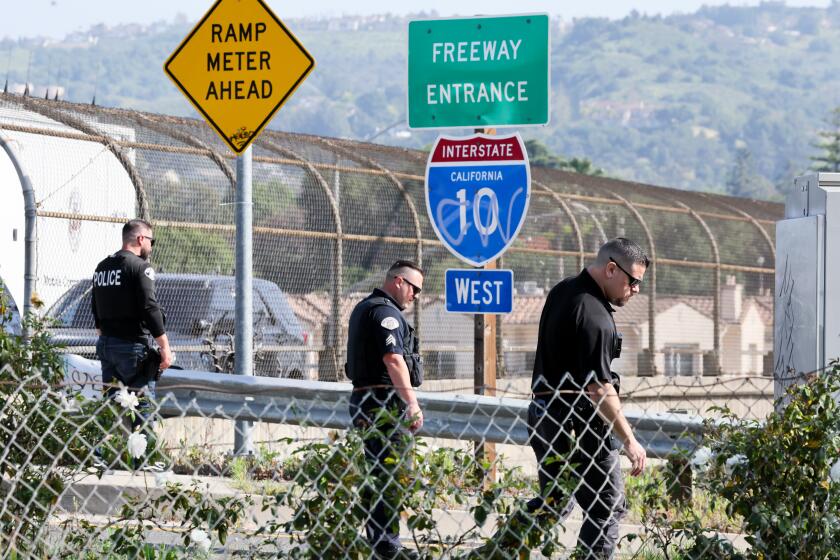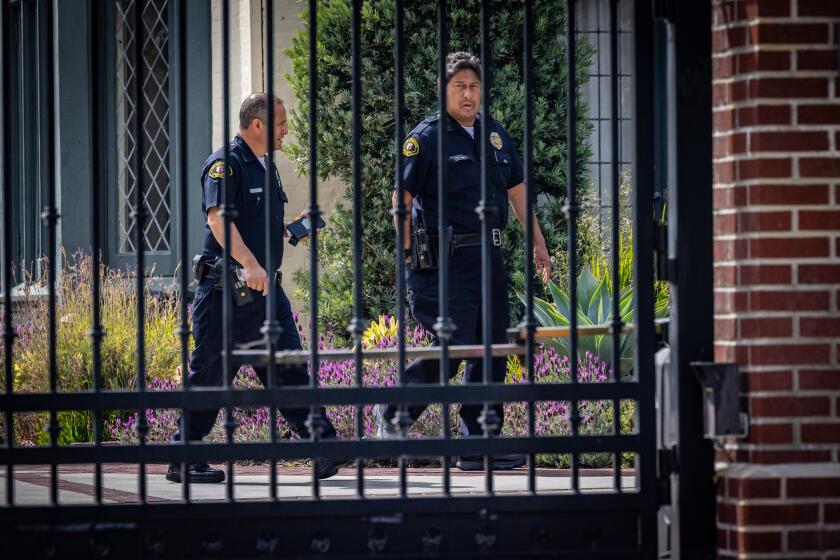Public Justice Foundation in L.A. Gets Under Law Profession’s Skin
Just a mention of the Public Justice Foundation sometimes is enough to crack the legal profession’s veneer of professional courtesy.
“They really know how to manage the press,” said Assistant Los Angeles County Counsel Frederick R. Bennett, who has fought--and lost--several cases filed by the unconventional, two-man, public-interest law firm. “I think that’s been their strongest point.”
Another lawyer said of Timothy B. McFlynn, the founder of the Santa Monica-based foundation: “McFlynn can’t decide which he wants to be, a scriptwriter for ‘L.A. Law’ or a practicing litigator.”
‘Have Cases Tried in Court’
A third attorney observed acerbically: “I’m an old-fashioned lawyer. I’d just as soon have the cases tried in court.”
But for McFlynn, 44, who looks more like a well-preserved surfer than a scrappy civil rights litigator, and his colleague, Randall L. Gephart, the courtroom is only one of the forums in which public-interest issues must be aired.
Court orders alone will not change the way that police, prosecutors and judges deal with the drunks, the mentally ill, the young runaways and the others who often crowd jails even though they have committed no serious criminal offense, McFlynn contends.
In many cases, McFlynn and Gephart argue, government agencies have failed to examine less costly and more effective alternatives to incarceration for these non-criminals. But to persuade government officials to act, they say, the public must first be convinced.
“What we really see ourselves as,” McFlynn said, “. . . is a mechanism to bring together diverse disciplines--not just lawyers doing lawsuits, but economists, public-sector finance people, public health, medical and social services people, to look at chronic, systemwide failures of the justice system--juvenile, adult, criminal, civil.”
“It’s not just civil rights, not just treating people in a humane fashion,” Gephart said. The taxpayer must be persuaded that doing what is right is also less expensive, he added.
That is where the 4-year-old Public Justice Foundation departs from more traditional law firms. Rather than rely on television and newspaper reporters to cull their pleadings from the thousands of lawsuits filed in California courts, McFlynn and Gephart actively promote their work, staging press conferences and suggesting story ideas.
Along with the legal work and the economic analyses, the attention paid to press relations is “all planned from the beginning to serve as kind of a third leg of this three-part strategy, the ultimate goal of which is to rally public support for the reform and to bring about the reform,” said Gephart, 34, a slightly owlish-looking man who once took a break from the law to teach scuba diving.
The media work does not end with press conferences. The foundation, along with Paul Mones, a former associate, is working with independent production companies to develop ideas for two television programs that may become NBC “Movies of the Week.”
One, titled “Too Young to Die,” is a story, based on fact about a runaway who becomes an accomplice to a murder, is convicted and sentenced to death. The second, to be produced by Marlo Thomas’ New York production company, Hart, Thomas & Berlin, concerns a working mother whose latchkey child is taken away by social workers. Officially, both projects are “in development,” an NBC spokesman said.
The foundation was also involved in the production of a 1986 KCET television documentary called, “Crimes of Neglect,” which examined the inability of the social service system to adequately provide for alcoholics, runaways and the mentally ill.
Received Award
The program, produced and written by Peter Graumann, won a Golden Mike award last January from the Radio & Television News Assn. of Southern California.
The Public Justice Foundation’s unconventional approach appears to be paying off.
Last year, for example, the foundation, working with the Youth Law Center in San Francisco, won court orders or settlements in four of the five cases filed as part of its California Campaign Against Jailing Children.
In the first and perhaps most significant ruling, a Superior Court judge in Long Beach ordered the city’s Police Department to discontinue the practice of holding abused or neglected children in jail. The judge also prohibited the department from confining other minors in cells next to adults.
In two other cases, judges ordered the Los Angeles County Sheriff’s Department to stop shackling children to the walls of the adult booking area in the Norwalk jail and to remove children from the adult section of the jail in Lennox.
In a fourth case, officials of rural Glenn County in Northern California agreed to pay $125,000 in damages to the family of a 15-year-old girl who hanged herself in the County Jail. The officials also agreed not to use the jail to lock up other juveniles. A fifth lawsuit against the California Youth Authority, also involving the incarceration of juveniles, is pending.
Signed Legislation
Besides the court victories, the Legislature passed and the governor signed legislation that strictly limits the practice of using adult jails and lockups to confine minors.
“We did a lot of educational, public educational work,” said McFlynn, who is blond and bearded and substitutes a business suit for a work shirt and jeans only when the occasion demands.
“It was a national television and radio story, and, of course, local. . . . We probably have a hundred articles and editorials on that campaign,” McFlynn said.
Among those who endorse the foundation’s approach is Jennifer Leonard, vice president for grants and administration of the California Community Foundation, which has contributed more than $25,000 to the foundation’s work.
“Tim McFlynn has a novel approach to bringing about some systemwide changes to benefit children and youth in California,” she said.
“They have been very active in Los Angeles County with limited resources,” said Mark I. Soler of the Youth Law Center, which did much of the legal research on the child-jailing cases. “They have pushed the idea of fiscal accountability . . . and this idea that it’s important to get these issues before the public. . . .”
But some lawyers have their reservations.
“I certainly have dealt with more formidable and skilled opponents,” said Bennett of the county counsel’s office. “I think they have obtained results which may not be described as remarkable. . . . Rarely do you ever see a lawsuit involving prisoners’ conditions in which the sheriff of a county says, ‘Well, we won everything.’ ”
Another attorney, who requested anonymity, said McFlynn and Gephart are more “idea people than follow-through lawyers. . . .”
‘Big Cases’
“They tend to want to file big cases that get a lot of attention that they can then hand off to other attorneys,” he said.
McFlynn founded the Public Justice Foundation in 1982 after working for seven years with the Center for Law in the Public Interest.
While at the center, he represented former alcoholic Robert Sundance in what became a landmark case that dramatically changed the way the Los Angeles Police Department handles public inebriates.
McFlynn also successfully represented Ronald A. Beltram, a mentally disturbed man whose condition, according to the lawsuit McFlynn filed, was exacerbated when he was held for eight days in Los Angeles County Jail. Filed in 1979, the case was finally settled two years ago.
“I think the main link (among the cases McFlynn has handled) is a perception that began in the late 1970s, as Sundance and Beltram and some of these other criminal justice reform cases were cooking along, that ultimately with financial austerity being the overriding consideration . . . that there was a very strong economic argument, every bit as strong as the legal argument, as to why these systemic changes should and must occur,” McFlynn said.
Previously, McFlynn practiced privately in Pacific Palisades and served for three years as a deputy district attorney for Los Angeles County, in the department’s public corruption unit. In those days, he was known as Timothy Flynn. After his marriage to Donna McGuirk, the couple merged their names.
Measure of Success
While the Public Justice Foundation has met a measure of success in the courts, the organization continues to struggle to raise money to finance its annual operating budget of $200,000 to $250,000, Gephart said.
Some of the money comes from private foundations. More comes from legal fees awarded by the courts as part of case settlements. When the foundation prevails on a legal issue, its fees are often paid by the public agency that was the target of the lawsuit. Nearly all of the clients the foundation represents are indigent.
As part of a strategy to put the organization on firmer financial footing, McFlynn and his family are moving to Denver this fall to begin a experimental affiliation with the University of Denver College of Law, where law students will work as interns for the foundation. Gephart will maintain the foundation’s office in the Ocean Park section of Santa Monica.
“There would be several benefits that don’t exist when you’re a free-standing law office, as we are here in Santa Monica,” McFlynn said. “You have immediate and daily access to not only the students . . . but you have access to the entire law faculty and the entire law student body for their expertise, their enthusiasm, their energy, their labor, their assistance--cost free.”
In addition, McFlynn said, “the presumption will be that by being part of the university, you’ll have greater access to and greater involvement of other scholars, of computer time, statisticians, public health experts, social work experts, child and family experts, that you simply don’t have when you’re essentially a law office.”
In Colorado, and in any new litigation the foundation may file, children are again likely to be the issue.
“I’d say the area of concentration, at least as long as we’re a very small organization . . . will be on the front end of the front end, which is kids,” McFlynn said.
“The whole notion of Public Justice is that you’ve got to move resources upstream. You’ve got to have early identification of learning disabilities, because there’s a direct link between learning disabilities and contact with the juvenile justice system. There are hundreds of examples like that. . . .
“The whole notion of ‘bang for the buck’ that is at the root of what we’re doing is that if you more promptly discover and appropriately respond to those kinds of problems, you reduce deviance and you reduce criminality and you reduce cost to the taxpayers. That’s really the whole idea.”
More to Read
Start your day right
Sign up for Essential California for news, features and recommendations from the L.A. Times and beyond in your inbox six days a week.
You may occasionally receive promotional content from the Los Angeles Times.






